Having trouble viewing this email? Click here to open in your browser.
|
|
|
|
|
|
|
|
|
|
|
|
|
This Month in Mongolian Studies is a monthly listing of selected academic activities, resources and other material related to Mongolia. This list is based on information the ACMS has received and is presented as a service to its members. If you would like to submit information to be included in next month's issue please contact the ACMS at info@mongoliacenter.orgThis publication is supported in part by memberships. Please consider becoming a member of the ACMS, or renewing your membership by visiting our website at mongoliacenter.org/join. Thank you!
|
|
|
|
|
|
|
|
|
|
|
ACMS Announcements, News and Media References
|
|
|
ACMS SUMMER 2019 FIELD SCHOOLS IN MONGOLIA -- JULY 29-AUGUST 16
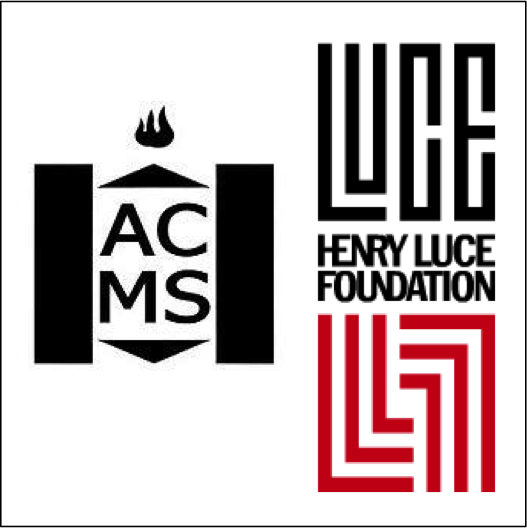 The American Center for Mongolian Studies is pleased to announce a new inter-disciplinary field school program to be held January 29-August 16 in Mongolia. The American Center for Mongolian Studies is pleased to announce a new inter-disciplinary field school program to be held January 29-August 16 in Mongolia.
The field school is open to undergraduate and graduate students, faculty and life-long learners interested in learning field research techniques and participating in research and activities that highlight the culture, history and environment of Mongolia. The program is open to people from all countries who have never visited Mongolia, and those who have extensive experience in the region.
ACMS appreciates the support of the Henry Luce Foundation for development of the program and for providing a substantial number of scholarships for North American and Mongolian participants.
The field school program offer three focus areas, archeology, rural-urban migration and renewable energy, led by experienced professors and academic researchers from universities in the United States, Canada and Mongolia.
Participants will gather in Ulaanbaatar for an orientation, and engage in a series of lectures and site visits and an active research project in one of the three focus areas. All field school participants will have the opportunity to visit Ulaanbaatar, the Lake Hovsgol region and other field sites in Mongolia.
The three focus areas and academic leaders include:
Dr. Julia Clark of NOMAD Science, who will lead a field archeology project in Hatgal, near Lake Hovsgol in northern Mongolia, that will combined academic anthropological archeology research with cultural heritage tourism and public anthropology.
The project will engage trained international and Mongolian archeologists, together with field school participants, to explore a newly discovered archeological site with layers of artifacts from the Neolithic to more recent periods of settlement. Participants will engage in hands-on field archeology, while also exploring ways that the site might be used as a public education and cultural heritage tourism site for the large number of Mongolian and international tourists visiting the world famous Lake Hovsgol region.
Dr. Holly Barcus of Macalester College, who will lead a study of rural-urban migration in Mongolia,exploring both the reasons people move to urban areas and the reasons people choose to remain in rural areas. More than 500,000 people have moved to Ulaanbaatar from rural areas of Mongolia in recent years, leading to serious issues related to housing, urban planning, air pollution, water and sanitation, transportation and public services such as education and health.
This field study will apply a social science research lens to examine key issues faced by migrants in urban Mongolia, while also understanding why some people choose to move to urban areas and other elect to stay in rural areas. Participants will have the opportunity to conduct interviews and site visits both in Ulaanbaatar, and in rural areas of Bulgan and Hovsgol aimags in northern Mongolia.
Dr. Darrin Magee of Hobart and William Smith Colleges and Dr. Charles Krusekopf of Royal Roads University will lead research into Mongolia's energy systems, with a focus on renewable power development including solar, wind and hydro power for both local and regional use. Mongolia is seen as a potential source of renewable energy to supply both domestic and regional power needs, but many local and international observers fear that large scale renewable power development will mar pristine landscapes, interrupt wildlife migration and displace local people.
Through this module, students will have the opportunity to conduct key informant interviews and surveys to gain an understanding of the technical and place-specific challenges and opportunities that arise from the development of renewable power, and the role Mongolian renewable power might play in the larger Asian electrical grid. Participants will visit solar and wind farms, the site of the planned Eiigin Gol Hydro Power project and small-scale wind and solar units used by rural herding families.
The program will be held July 29-August 16, 2019, and will start and end in Ulaanbaatar. All participants will spend time in both Ulaanbaatar and Hatgal, near Lake Hovsgol in northern Mongolia, in addition to conducting field site visits as appropriate for their area of study. As noted, the program is open to undergraduate and graduate students, faculty members and other interested persons. Previous experience in Mongolia or with field studies is not required.
Tuition for the program is $2,900 for all participants to cover program costs in Mongolia, including meals, housing, domestic transportation, instruction and site visits. A significant number of scholarships of up to $3,500 are available based on merit and need through the generous support of the Henry Luce Foundation.
Participants are responsible for making their own travel arrangements to and from Ulaanbaatar. Students who are seeking academic credit for the program can work with program organizers and their home institution to ensure the program meets credit requirements.
Application details and materials will be available in Fall 2018 through the ACMS website (www.mongoliacenter.org), with an application deadline in Spring 2019.
If you have questions or are interested in being placed on a special distribution list with information on the program and application details, please e-mail program director Dr. Charles Krusekopf at ckrusekopf@mongoliacenter.org
**********************************************
ACMS MEMBER DONATES ACADEMIC BOOKS TO SCHOOLS IN MONGOLIA
Thanks to a generous personal donation from ACMS member Blake Epstein, ACMS was able to distribute more than 500 English-language academic books to Mongolian schools. ACMS identified 10 schools that follow a Cambridge curriculum and could therefore benefit from the use of these books that cover several subjects including physics, calculus and algebra. The school received the books just in time for the start of the new academic year.
Staff from various schools expressed appreciation for the book donation, which should benefit students for years to come. Here is one example from one of the schools that participated:
Our New Beginning International School of Mongolia has received 50 great books on nature science through the American Center for Mongolian Studies. We are deepy thankful for (Blake) Epstein's donation of these 50 books for our students. All of our students, teachers and staff express our deep thanks and best wishes.
**********************************************
ACMS WELCOMES NEW COMMUNICATIONS SPECIALIST TO UB OFFICE
Natso Baatarkhuu recently joined the ACMS office in Ulaanbaatar as Communications Specialist. Already well-travelled, he received his BA in English Philology from Tomas Bata University as a participant in the Czech-Mongolian bilateral scholarship program and an MA in Creative Writing from Temple University as a Fulbrighter.
Previously, Natso was English editor for the ASEM11 Summit Task Force. Prior to that, worked for a number of international organizations including the Millennium Challenge Corporation, UNDP and the Asian Development Bank. When not glued to a computer screen or reading a book, he is spending time with his wife and two kids. Welcome, Natso!
**********************************************
ACMS SUMMER MONGOLIAN LANGUAGE STUDENTS GIVE HIGH MARKS TO QUALITY OF PROGRAM
 The five students participating in this summer's ACMS Mongolian language program in Ulaanbaatar provided both positive feedback and useful suggestions in the survey that followed. Nearly three out of every four box "checked" was in the "very satisfied category," covering areas such as "meeting expectations," "quality of instruction" and "would recommend to others". Tserma as language teacher received very positive reviews. The five students participating in this summer's ACMS Mongolian language program in Ulaanbaatar provided both positive feedback and useful suggestions in the survey that followed. Nearly three out of every four box "checked" was in the "very satisfied category," covering areas such as "meeting expectations," "quality of instruction" and "would recommend to others". Tserma as language teacher received very positive reviews.
Written feedback was also useful, elaborating further on a very positive quantitative assessment while also providing constructive input aimed at further strengthening next year's program. For example, one student described "Quality of instruction, friendly ACMS staff and library resources" as among "the best aspects of the program". Another remarked that "It was really more than I could have hoped for -- a wonderful, formative experience".
Other comments of interest include:
-- "I found the textbook and related instructional material very helpful"
-- "The whole course not only met my expectations but exceeded them by alot"
-- "The teacher managed to both push us really hard and encourage us"
-- "ACMS (did) a great job to make this experience beneficial and unique for me"
-- "Skilled and experienced teacher"
-- "Recently I spoke for four hours only in Mongolian . . . it was amazing"
Most students had heard about the ACMS program through teachers or colleagues, from the ACMS website or through a google search. Looking ahead to the ACMS Summer 2019 Mongolian language program in Ulaanbaatar, we urge our readers to pass on the word: "This is a terrific program and one of the best ways to learn Mongolian in Mongolia"!
**********************************************
ACMS ALSO OFFERS YEAR-ROUND MONGOLIAN LANGUAGE OPPORTUNITIES
 ACMS offers private Mongolian language lessons for students and researchers of varying levels at the ACMS classroom in Ulaanbaatar year round. ACMS has been organizing language and cultural programs since 2008, allowing studnets to improve their reading, writing, listening and speaking skils as well as their knowledge of Mongolian culture. ACMS offers private Mongolian language lessons for students and researchers of varying levels at the ACMS classroom in Ulaanbaatar year round. ACMS has been organizing language and cultural programs since 2008, allowing studnets to improve their reading, writing, listening and speaking skils as well as their knowledge of Mongolian culture.
Our experienced language teacher will design a custom curriculum and materials for each student based on their skill level, research topic and overall goals. The ACMS language program has been instrumental in providing countless researchers with the language skills they need to be successful in their research in Mongolia.
Please also note the rates for this program:
-- 40,000 MNT/hour for one-on-one lessons
-- $20/hour for one-on-one Skype lessons
-- Survival Mongolian Language Class for Beginners (up to 10 students on Mondays, Wednesdays and Fridays for two hours for two weeks for a total of 12 hours), 300,000 MNT per student
-- Verticle Script Class (up to 5 students or individual instruction), 40,000 MNT/hour
For more information and to enroll, please contact: info@mongoliacenter.org
**********************************************
MEDIA REFERENCES
 ACMS Executive Director Jonathan Addleton's op-ed on trade issues related to Mongolia was posted by GlobalAtlanta on September 6. Among other things, it highlighted pending bi-partisan legislation that would grant a five-year duty-free "window" for animal fiber exports from Mongolia to the United States including cashmere, yak wool and camel wool -- a provision that could have a highly beneficial impact on Mongolian herders. A link to the op-ed, titled "Cashmere from Mongolia: One Way to Smooth Out Washington's Partisan Differences?", is provided here. ACMS Executive Director Jonathan Addleton's op-ed on trade issues related to Mongolia was posted by GlobalAtlanta on September 6. Among other things, it highlighted pending bi-partisan legislation that would grant a five-year duty-free "window" for animal fiber exports from Mongolia to the United States including cashmere, yak wool and camel wool -- a provision that could have a highly beneficial impact on Mongolian herders. A link to the op-ed, titled "Cashmere from Mongolia: One Way to Smooth Out Washington's Partisan Differences?", is provided here.
**********************************************
ACMS MEMBERSHIP RENEWALS
It is approaching that time of year again -- ACMS membership renewals generally follow our fiscal year of October 1st to September 30th. That means it may again be time for to renew your membership. If you are not already a member of the ACMS, please consider becoming a member.
ACMS Members are an important part of the governance of the organization, having voting rights to elect “At-Large” representatives of the Board of Directors for individual and student members and rights to nominate a representative on the Board of Directors for institutional members. The Board of Directors is the governing body of the organization, and it has complete authority over all programs and activities. Members, both individual and institutional, therefore have a direct stake in the future development of the organization.
Membership is open to individuals, corporations, and institutions that support the ACMS's mission of promoting scholarship in Mongolia, and dues go directly towards supporting the programmatic and administrative expenses of the organization. As a registered 501(c)3 non-profit, academic organization, membership dues and other donations paid to the ACMS are tax deductible in the United States.
For more information on member benefits and membership options, please see our membership page.
|
|
ACMS Sponsored Programs and Events
|
|
ACMS SPEAKER SERIES
Chantsallkham Jamsranjav: "Herders, Indicators and Ratings Predict Rangeland Conditions in Three Mongolian Ecological Zones"
5:30 PM on Tuesday, October 2 at the American Corner, Ulaanbaatar Public Library
 Given growing research on traditional ecological knowledge and its use in resource management, there is a need to better understand the relationship between those indicators used by researchers to assess resource conditions and those used by local herders. To better understand indicators used by herders, the presenter in this lecture will discuss the results of field interviews conducted with 26 herders in three ecological zones in Mongolia. Given growing research on traditional ecological knowledge and its use in resource management, there is a need to better understand the relationship between those indicators used by researchers to assess resource conditions and those used by local herders. To better understand indicators used by herders, the presenter in this lecture will discuss the results of field interviews conducted with 26 herders in three ecological zones in Mongolia.
Each herder was asked to (1) assess the overall condition of three different sites located along a livestock-use gradient from their winter camp using a numeric scale; (2) describe the indicators used in their assessment; and (3) explain what caused their pastures to remain healthy or become degraded. At each site, field data on vegetation variables was also collected and then compared with that reported by the ratings and indicators provided by these herders using a linear regression.
Across all three ecological zones, herders used four main indicators when defining rangeland health: vegetation composition; number of plants that emerge or sprout during the growing season (called garts by herders); vegetation productivity (called urgats by herders); and forage suitability for livestock.
Herder assessment scores correlated significantly and positively with measured total foliar cover in all three ecological zones and with additional measured variables in the steppe and desert steppe. These and a series of other results show promise for developing integrated indicators and monitoring protocols and highlight the importance of developing a common language of monitoring terminology shared by herders, government monitoring agencies and researchers.
Chantsallkham Jamsranjav's career in rangeland ecology and community-based natural resource management has focused on the science and practice of sustainable resource management with a special interest in working with local herder commmunities in Mongolia. She has a PhD in Rangeland Ecosystem Science and has just completed post-doctoral study in the Forest and Rangeland Stewardship Department at Colorado State University. Prior to her PhD, she worked with different international development and resource conservation organizations, focusing on strenghthening local capacity to improve livelihoods and strengthen community-based resource management.
*********************************************
Bryan K. Miller: "In Search of 'Commoners' in the Xiongnu Empire"
5:30 PM on Wednesday, September 19 at the American Corner, Ulaanbaatar Public LIbrary
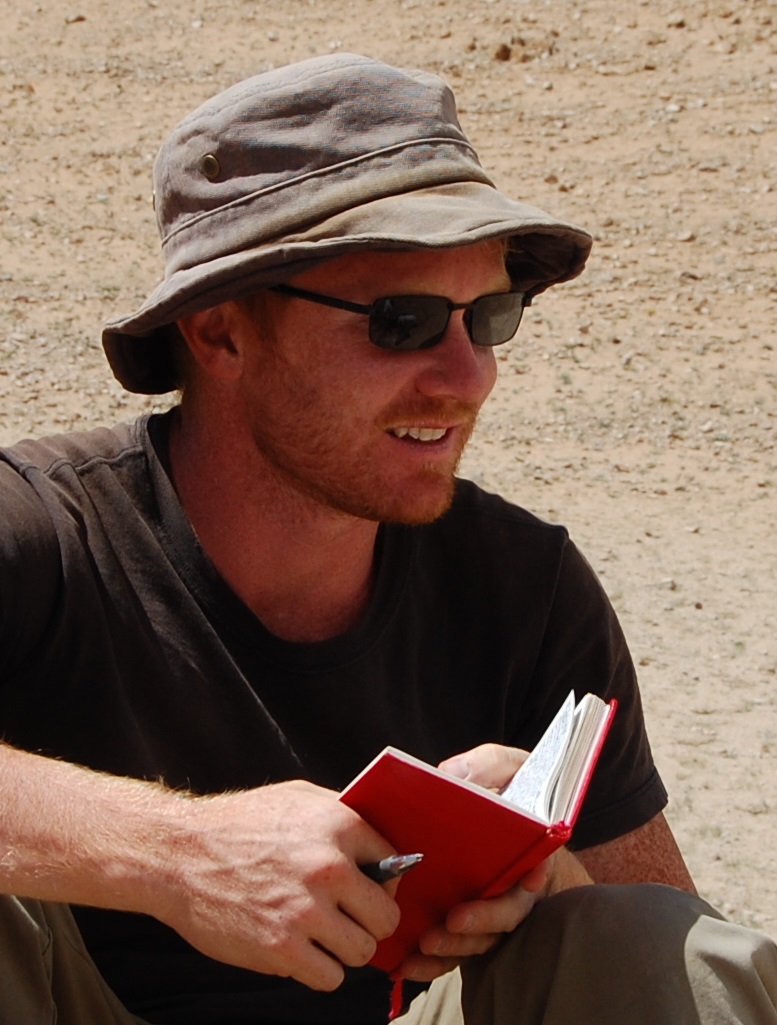 As Bryan Miller noted in his lecture on September 19, the Xiongnu regime mobilized a vast variety of herder households and mounted archers across Inner Asia. Yet much of the scholarly attention given to this first nomadic empire has focused on the uppermost echelons, whether thorugh historical accounts of famous battles and court intrigues or through excavations of massive ramped tombs of the steppe rulers or standard ring-marked graves of the local elites. As Bryan Miller noted in his lecture on September 19, the Xiongnu regime mobilized a vast variety of herder households and mounted archers across Inner Asia. Yet much of the scholarly attention given to this first nomadic empire has focused on the uppermost echelons, whether thorugh historical accounts of famous battles and court intrigues or through excavations of massive ramped tombs of the steppe rulers or standard ring-marked graves of the local elites.
These more prominent members of the steppe empire may have controlled the resources -- namely animals, people and products -- but they did not constitute the common warriors of the empire. Against that backdrop, this presentation addressed a collection of historical and archaeological evidence -- from frontier records of small raiding parties to scattered remains of ephemeral campsites --çe.
Delving further into the lower echelons of Xiongnu society, it is possible to also revisit the numerous cemeteries that have been studied throughout Inner Asia with greater attention to the smallest of features, those interments without offerings or containments for the deceased which usually go unnoticed or unexcavated but are just as telling. Through these, it is possible to begin to glean an understanding of not only the lifeways of more ordinary peoples but also of their place amidst local elites and the roles of "commoners" in the steppe pastoral society oriented toward elevating and sustaining the small faction of Xiongnu rulers.
Bryan K. Miller received an MA in Archaeology from UCLA and a PhD in East Asian Civilizations from the University of Pennslvania. His research investigates the history and archaeology of early empires in East Asia, focusing on the social, cultural, economic and political developments of the Xiongnu nomadic empire and its interactions with neighboring powers of Eurasia, most especially the nascent Chinese empire.
Miller's more recent field project, in collaboration with the National Museum of Mongolia, investigates the emergence of urbanism in the Inner Asian steppe during the course of the early nomadic empires. He is currently completing a book that integrates the full corpuses of historical records and archaeological data across northern China, Mongolia and southern Siberia in order to present a robust and dynamic narrative of the long life of the Xiongnu -- the world's first nomadic empire.
ACMS FELLOWSHIP SUMMARY REPORT
Christopher McCarthy: "A Rediscovery of Ancient Mongolia: Caravan Route to Tibet"
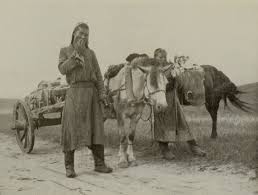 ACMS Summer Fellow Christopher McCarthy from Johns Hopkins University concluded his Mongolia-based ACMS field research fellowship on August 29, 2018, providing an important opportunity to conduct a spatial and environmental enviromental inventory of the region. ACMS Summer Fellow Christopher McCarthy from Johns Hopkins University concluded his Mongolia-based ACMS field research fellowship on August 29, 2018, providing an important opportunity to conduct a spatial and environmental enviromental inventory of the region.
Among other things, his work helps corroborate accounts provided by late 19th and early 20th century travellers including Roerich, Gombojav, Prezwalsky and Roy Chapman Andrews. It should also provide opportunities to further understand the geographic and historical characteristics that have helped shape political, religious and economic interactions between the Mongolian and Tibetan people since the 13th century.
Surveys of herder households revealed the dramatic changes occurring as a result of climate change and development. Hopefully, this work will also contribute toward the researcher's interest in supporting a long-term goal to promote conservation in the Gobi.
Highlights from the field research include:
-- Discovery, mapping and documentation of numerous temples along the route
-- Discovery of numerous padme hum stones along the route from Ulaanbaatar to the border of China
-- The discovery of Jalama's desert fortress
-- Witness and documentation of an impressive display of biodiversity in the Gobi (maazalai, khulan, gazelle, wolf, fox, etc.)
-- Aerial imagery and video of Gobi landscapes for use in conservation studies
-- More than 30 interviews with herder households
-- Nature sound recordings
During the coming months, data analysis will continue, hopefully followed by academic articles that further explore the history/geography of the route from Mongolia to Tibet as well as the architecture/social characteristics of important temple complexes encountered along the way.
Thematic maps showing the caravan and pilgrimage route and various points of interest, supplemented by images, video and sound, will be developed. Also, further study, exploration and development of a conservation and cultural heritage plan is anticipated.
For those with an interest in this research, feel free to contact Christopher McCarthy directly at the following e-mail address: cmccar27@jhu.edu
|
|
|
|
|
|
NO ANNOUNCEMENTS FOR POSITION OPENINGS RECEIVED
|
|
Research Fellowships, Scholarships and Grants |
|
CAORC ANNOUNCES 2018-2019 NEH SENIOR RESEARCH FELLOWSHIP; APPLICATIONS NOW AVAILABLE ON-LINE
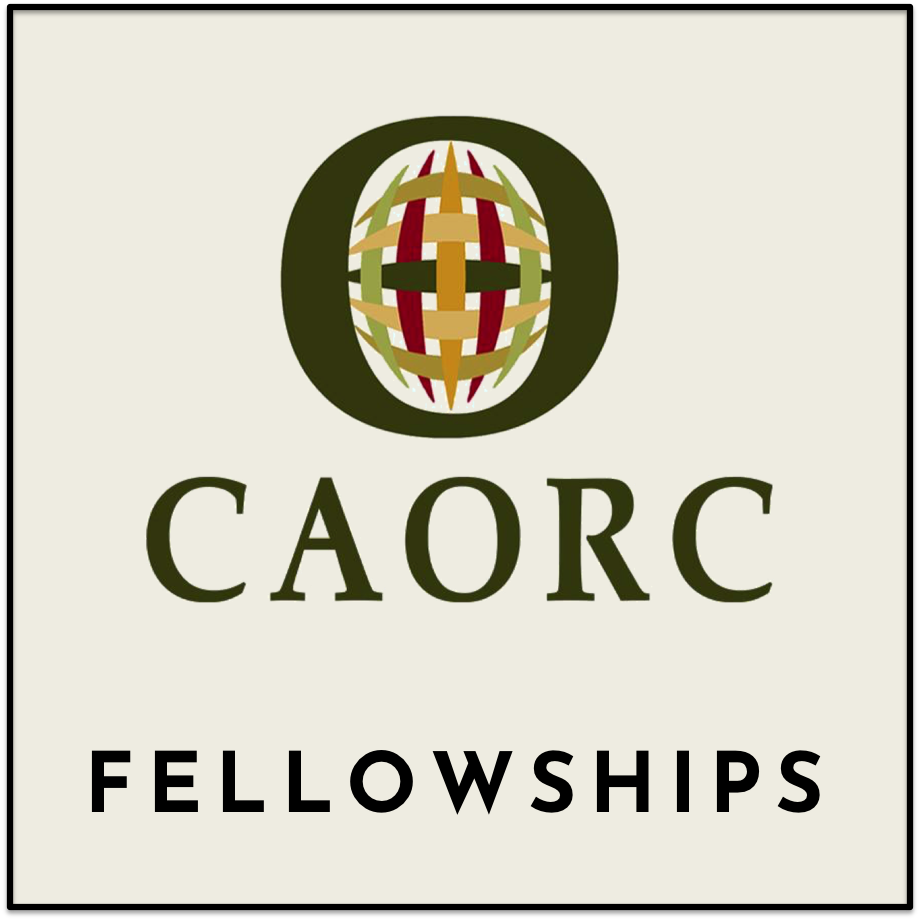 The Council on Overseas American Research Centers (CAORC) -- which includes ACMS among its members -- announces its National Endowment for Humanities (NEH) Senior Research Fellowship for 2018-2019, supporting advanceed research in the United States for US postdoctoral scholars and foreign postdoctoral scholars who have been residents in the US for at least three years. Fellowship stipends are $4,200 per month, up to a total of four consecutive months. The Council on Overseas American Research Centers (CAORC) -- which includes ACMS among its members -- announces its National Endowment for Humanities (NEH) Senior Research Fellowship for 2018-2019, supporting advanceed research in the United States for US postdoctoral scholars and foreign postdoctoral scholars who have been residents in the US for at least three years. Fellowship stipends are $4,200 per month, up to a total of four consecutive months.
Mongolia is included on this year's list of eligible countries, along with Algeria, Armenia, Azerbaijan, Cambodia, Cyprus, Georgia, Indonesia, Mexico, Morocco, Nepal, Senegal, Sri Lanka and Tunisia. Research should take place during the period May 2019 through November 2020.
Applications for the NEH Senior Research Fellowship must be submitted by January 24, 2019 with announcements on awardees provided by the end of April 2019.
For more information see:
CAORC on-line grant portal: orcfellowships.fluidreview.com
Additional information: caorc.org/fellowships
**********************************************
CAORC ANNOUNCES 2018-2019 MULTI-COUNTRY RESEARCH FELLOWSHIPS;
APPLICATIONS NOW AVAILABLE ON-LINE
 CAORC also announces its Multi-Country Research Fellowship Program, supporting advanced regional or trans-regional research in the humanities, social sciences or allied natural sciences for US doctoral candiates and scholars who have already earned their PhD. CAORC also announces its Multi-Country Research Fellowship Program, supporting advanced regional or trans-regional research in the humanities, social sciences or allied natural sciences for US doctoral candiates and scholars who have already earned their PhD.
Preferences will be given to candidates focused on comparative and/or cross-regional research. Scholars must carry out research in two or more countries outside the US, at least one of which hosts a participating American overseas research center (such as ACMS). Approximately eight awrads of up to $10,500 each will be given each year.
Applicants must be US citizens; have a PhD or be a doctoral candidate who has completed all PhD requirements with the exception of the dissertation; and be engaged in the study of and research in the humanities, social sciences or allied natural sciences.
Proposed research must be conducted in two or more countries outside the US, one of which must host a participating CAORC center. Travel is not currently possible in the following countries with research centers: Afghanistan, Bangladesh, Iran, Iraq, Pakistan (though senior scholars may be permitted to travel with permission to Lahore and Islamabad) and Yemen.
Applications for the CAORC Muli-Country Research Fellowships must be submitted by January 24, 2019 with announcements on awardees provided by the end of April 2019.
For more information see:
CAORC on-line grant portal: orcfellowships.fluidreview.com
Additional information: caorc.org/fellowships
**********************************************
ASIA FOUNDATION ANNOUNCES 2019 DEVELOPMENT FELLOWS PROGRAM
 The Asia Foundation is now accepting applications for the 2019 Asia Foundation Development Fellows Emerging Leadership for Asia's Future program. Applications will be accepted through October 22, 2018. The Asia Foundation is now accepting applications for the 2019 Asia Foundation Development Fellows Emerging Leadership for Asia's Future program. Applications will be accepted through October 22, 2018.
Launched in 2014 to engage and empower a dynamic community of emerging leaders from across Asia, the program brings together a group of accomplished individuals under 40 years of age -- NGO and civil society leaders, government officials and policymakers, social entrepreneurs, journalists, environmentalists and academics -- who are deeply committed to an inclusive Asia.
The 2019 program will consist of two intensive modules, including two weeks in Asia in the spring and another two weeks in the United States in the fall, allowing Fellows to stay in their current occupations during the Fellowship year.
The program will start in April 2019 with a Leadership Training Program in Korea, presented in partnership with the Korea Development Institute, and will continue in Indonesia for a Workshop on Asian Development, where Fellows will engage wth various development practitioners to understand the mechanics of change on the ground.
In September the Fellows will visit San Francisco and Washington, DC for a Leadership Dialogue and Exchange. A flexible professional development award of $5,000 will also be provided to each Fellow to use throughout the Fellowship year.
For more information on eligibility and the application process, visit: www.asiafoundation.org/developmentfellows
|
|
|
|
|
MIAMI UNIVERSITY IN OHIO ANNOUNCES 2018-2019 PROJECT DRAGONFLY, PROVIDING STUDY OPPORTUNITIES IN 16 COUNTRIES INCLUDING MONGOLIA
 Miami University's Project Dragonfly is now accepting applications for its 2019 Earth Expeditions graduate courses, offering experiences in Mongolia and 15 other countries. The Mongolian program explores the country's steppe landscape, engaging in particular on conservation related to two steppe species: the Pallas" cat and Przewawlski's horse. Students experience the vastness of the Mongolia countryside while also learning about media, local knowledge and community-based conservation. Miami University's Project Dragonfly is now accepting applications for its 2019 Earth Expeditions graduate courses, offering experiences in Mongolia and 15 other countries. The Mongolian program explores the country's steppe landscape, engaging in particular on conservation related to two steppe species: the Pallas" cat and Przewawlski's horse. Students experience the vastness of the Mongolia countryside while also learning about media, local knowledge and community-based conservation.
Partcipation in Earth Expeditions can also build toward the Global Field Program (GFP), a master's degree that combines summer field courses worldwide with web learning communities, providing opportunities to complete the GFP master's part-time from anywhere in the United States or abroad.
For more information see:
http://GFP.MiamiOH.edu
http://EarthExpeditions.MiamiOH.edu
*********************************************
PHOTOGRAPHER FREDERIC LAGRANGE ANNOUNCES LAUNCH OF NEW PROJECT FEATURING PHOTOGRAPHS FROM MONGOLIA
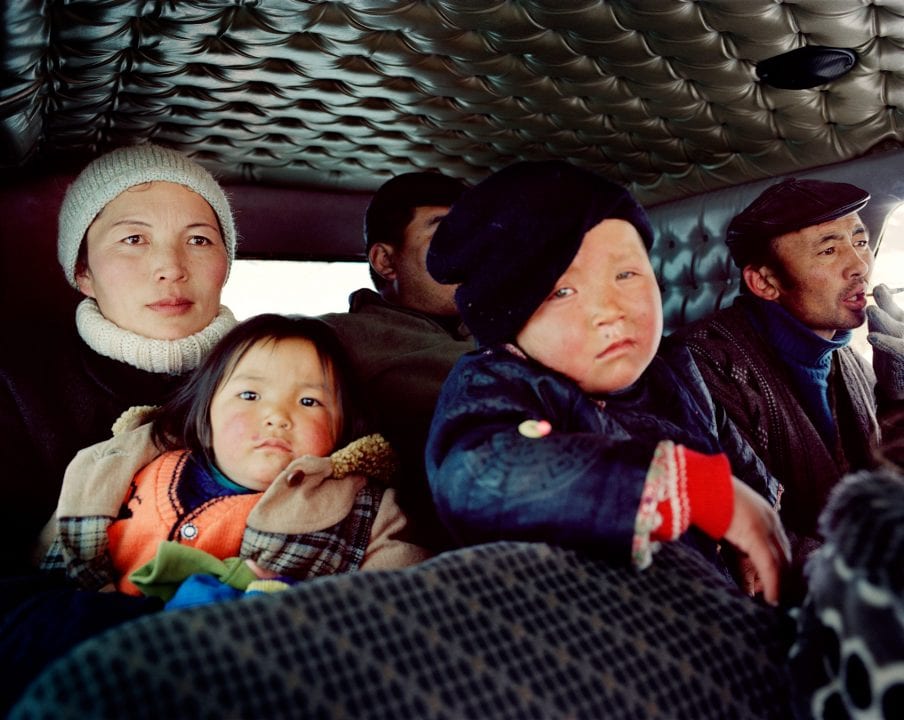 Photographer Frederic Langrange, born in France and now living in Brooklyn, New York, has announced via Kickstart the launch of a new project that includes both a large-format art book simply titled Mongolia and individual color and black and white photographs from across Mongolia. Photographer Frederic Langrange, born in France and now living in Brooklyn, New York, has announced via Kickstart the launch of a new project that includes both a large-format art book simply titled Mongolia and individual color and black and white photographs from across Mongolia.
A seventeen-year effort starting with Lagrange's first visit to Mongolia in August 2001, the book includes photos taken during all seasons. The collection is visually stunning and includes both landscapes and portraits. Text is also provided, written by the well-known travel writer Pico Iyer.
Lagrange's work covers a number of themes including travel, fashion and portraiture. His photos have been published in a number of magazines including Vogue, Vanity Fair, Conde Naste Traveller, GQ, New Yorker and the New York Times Magazine. Much of his travel work focuses on South Asia, South East Asia and Central Asia.
For more details as well as information on purchasing Mongolia as well as individual photographs at a discounted price (through October 25), connect to the following website: www.fredericlagrange-mongolia.com
|
|
|
|
|
The Mongol Empire by Timothy May; 440 pages, 53 illustrations; hardcover; $44.95 (Edinburgh University Press, 2018)
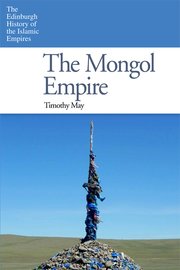 Timothy May, active in both ACMS and the Mongolia Society, has just published a new book on the Mongol Empire, the "largest contiguous empire in history," one that "permanently changed the map of Eurasia as well as how the world wa viewed." As the publisher notes, "the Mongols were alternatively seen as liberators, destroyers and harbingers of apocalyptic doom. At the same time, they ushered in an era of religious tolerance and cross-cultural transmission". Timothy May, active in both ACMS and the Mongolia Society, has just published a new book on the Mongol Empire, the "largest contiguous empire in history," one that "permanently changed the map of Eurasia as well as how the world wa viewed." As the publisher notes, "the Mongols were alternatively seen as liberators, destroyers and harbingers of apocalyptic doom. At the same time, they ushered in an era of religious tolerance and cross-cultural transmission".
This volume is part of a continuing series, published as part of the "Edinburgh History of the Islamic Empires". As such, it "explores the rise and establishment of the Mongol Empire under Chinggis Khan as well as its expansion and evolution under his successors. It also examines the successor states (Ilkhanate, Chaghatayid Khanate, the Jochid Ulus (Golden Horde), and the Yuan Empire) from the dissolutoin of the empire in 1260 to the end of each state. They are compared in order to reveal how the empire functioned not only at the imperial level but how regional differences manifested".
Timothy May is Professor of Central Eurasian Studies and Associate Dean, College of Arts and Letters at the University of North Georgia in Dahlonega, Georgia. A specialist on the history of the Mongol Empire, he has authored or edited six books as well as advised on several television shows. He is also editor of Mongolian Studies: The Journal of the Mongolian Society.
*********************************************
Mongolia Remade: Post-Socialist National Culture, Political Economy and Cosmopolitics by David Sneath; 252 pages; hardcover; 85 UK pounds (Amsterdam University Press, 2018)
 According to the publisher, "This collection explores historical and contemporary processes that have made and remade Mongolia as it is today; the construction of ethnic and national cultures, the transformations of political economy and 'nomadic' pastoralism, and the revitalization of a religous and cosmological heritage that has led to new forms of post-socialist politics". According to the publisher, "This collection explores historical and contemporary processes that have made and remade Mongolia as it is today; the construction of ethnic and national cultures, the transformations of political economy and 'nomadic' pastoralism, and the revitalization of a religous and cosmological heritage that has led to new forms of post-socialist politics".
As the publisher also notes, "Mongolia underwent two episodes of revolutionary change in the 20th century; first the overthrow of a Buddhist aristocracy and the construction of a Soviet-style modernist nation-state, and then the collapse of state socialism and the introduction of a 'neoliberal' market economy and parliamentary system".
The volume includes both new and previously published work by David Sneath, with a special emphasis on exploring "the major historical processes that made and remade Mongolia as it is today: the construction of ethnic and national cultures from the aristocratic orders of the past; the transformations of political economy and 'nomadic' pastoralism from pre-revolutionary times to the present-day; and the revival and re-invention of ritual pratices that have made Mongolia's cosmological heritage the subject of new forms of politics. This study brings together constructionist social theory, political economy and historically-informed anthropology to offer a distinctive account of social and cultural change".
David Sneath is Director of the Mongolia and Inner Asia Studies Unit and Reader at the Department of Social Anthropology, University of Cambridge. He has over 50 publications including three monographs and three multi-volume edited works.
*********************************************
Central Asian Studies (Volume 37: 2018); Special Issue focused on "Capitalism in Mongolia"
 Those who follow the economics and politics of post-Soviet Mongolia will definitely want to access the latest issue of Central Asian Studies, available in both "hard copy" and in an open-access on-line version. Covering a number of important topics, the volume concludes with a final reflection from David Sneath titled "Mongolian-Made Capitalism". Specific articles featured include: Those who follow the economics and politics of post-Soviet Mongolia will definitely want to access the latest issue of Central Asian Studies, available in both "hard copy" and in an open-access on-line version. Covering a number of important topics, the volume concludes with a final reflection from David Sneath titled "Mongolian-Made Capitalism". Specific articles featured include:
"Capitalism in Mongoli -- Ideology, Practice and Ambiguity" by Rebekah Plueckhahn and Dulam Bumochir
"Generating Capitalism for Independence in Mongolia" by Dulam Bumochir
"The Formation and Distribution of Pro-Capitalist Perspectives in Mongolia" by Gantulga Munkherdene
"Collaboration for Survival in the Age of the Market: Diverse Economic Practices in Post-Socialist Mongolia" by Byambataatar Ichinkhorloo
"The Financialization of Help: Money Lenders as Economic Translators in the Debt-Based Economy" by Hedwig Amelia Waters
"Networks and the Negotiation of Risk: Making Business Deals and People Among Mongolian Small and Medium Businesses" by Narantuya Chuluunbat and Rebecca Empson
"Negotiation, Social Indebtedness and the Making of Urban Economies in Ulaanbaatar" by Rebekah Plueckhahn and Terbish Bayartsetseg
"Electoral Gifting and Personal Poitics in Mongolia's Parliamentary Election Season" by Lauren Bonilla and Tuya Shagdar
"Afterward: Mongolian-Made Capitalism" by David Sneath
The latest issue of Central Asian Survey can be accessed here.
*********************************************
Mongolian Studies: Journal of The Mongolia Society (Volume XXXVII: 2015), edited by Timothy May, 150 pages
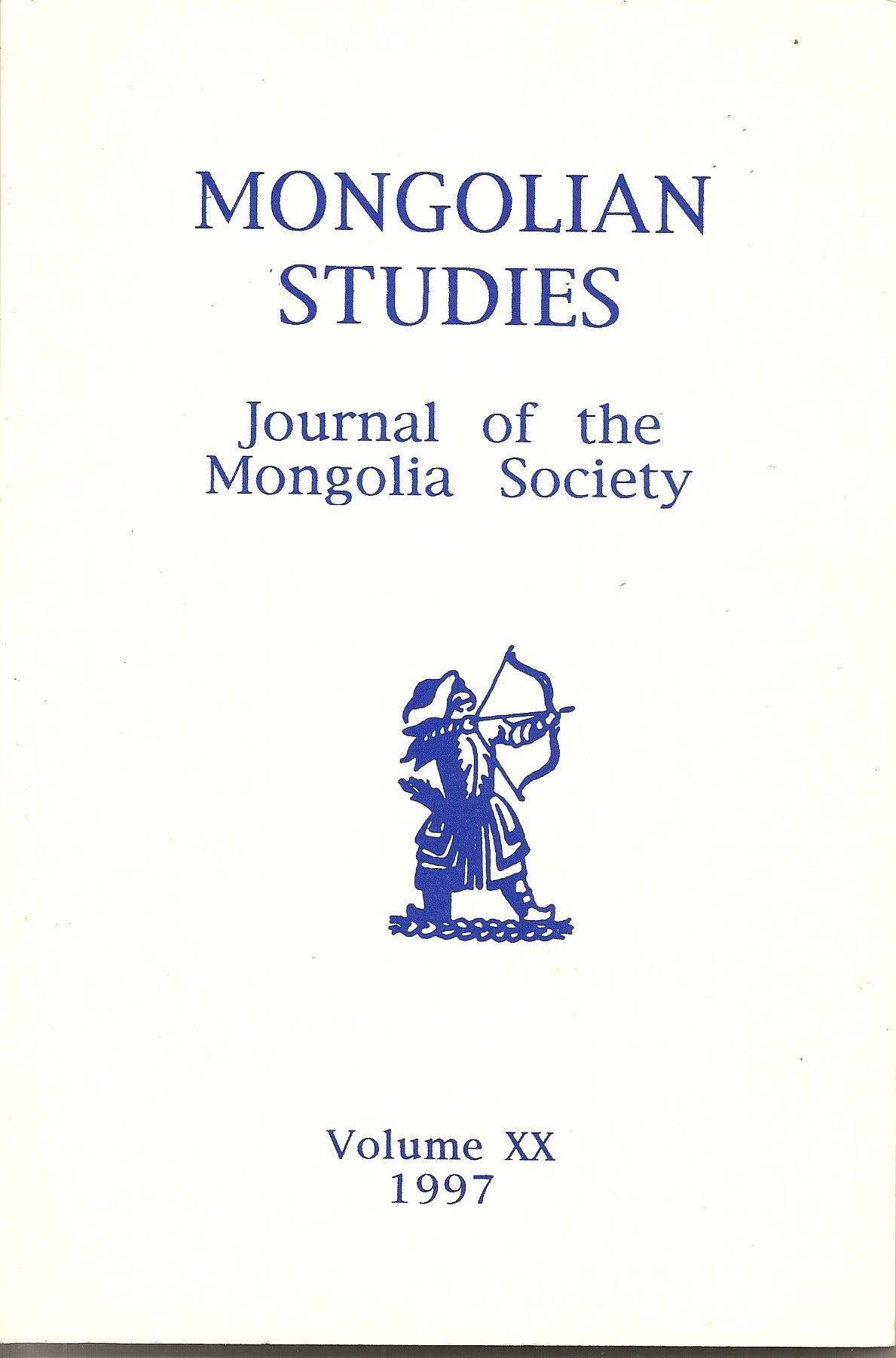 Though presented as "Volume XXXVII: 2015", this latest edition of Mongolian Studies, published in summer 2018, is part of a continuing effort on the part of the Mongolia Society to bring this pioneering Mongolia-specific journal up-to-date. Edited by Timothy May, this latest volume includes a wonderful collection of informative articles and book reviews that will be welcomed by all those interested in Mongolia: Though presented as "Volume XXXVII: 2015", this latest edition of Mongolian Studies, published in summer 2018, is part of a continuing effort on the part of the Mongolia Society to bring this pioneering Mongolia-specific journal up-to-date. Edited by Timothy May, this latest volume includes a wonderful collection of informative articles and book reviews that will be welcomed by all those interested in Mongolia:
"In Mememoriam: James Bosson (1933-2016) and Mongolian Studies at UC Berkeley" by Uranchimeg Tsultem
"Two Twentieth-Century Mongolian Musicians, Parts 1 and 2" by Mary Rossabi, Yuki Konagaya and Morris Rossabi
"The Geographical Study of Mongolia: A Scholarly Bibliography" by Thomas Rumney
"Daily LIfe of the Dzhida Buryats in the Reminiscences of Galina Tudinova" by Robert W. Montgomery
"Bible Translations in Mongolia" by Gyorgy Kara
This edition also includes the final edition of Henry G. Schwarz's invaluable "Book Notices and Other Books Received as Part of the Mongolian Collection at Western Washington University"
Finally, an informative book review section includes reviews by Timothy May (The Eurasian Way of War: Military Practice in Seventh-Century China and Byzantium by David A Graff); Beatrice Manz (Power, Politics and Tradition in the Mongol Empire and the Ilkhanate of Iran by Michael Hope); Christopher P. Atwood (The Translation Chapter of the Late Ming Lulongsai Lue: Bilingual Sections of a Chinese Military Manual by Akos Bertalan Apatoezky; Uranchimeg Tsultem (The Biography of the First Khalkha Jetsundampa Zanabazar by Zaya Pandita Luvsanprinlei by Agata Bareja-Starzynska); and Steve Pieragastini (Building New China: Colonizing Kokomor: Resettlement in Qinghai in the late 1950s by Gregory Rohlf)
********************************************
The Time of Heaven by Punsalmaaglin Ochirbat; $50 (Mongolia Society Occasional Papers Historical Series Number 28, 2018)
 Thanks partly to support from former US Ambassador to Mongolia Pamela Slutz, an English language translation of President Ochirbat's memoirs is now available as the latest in the Mongolia Society's Historical Series of Occasional Papers. Thanks partly to support from former US Ambassador to Mongolia Pamela Slutz, an English language translation of President Ochirbat's memoirs is now available as the latest in the Mongolia Society's Historical Series of Occasional Papers.
According to a summary provided by the Mongolia Society, the memoir "traces the paths that took (Ochirbat) from rural Mongolia to the highest office in the land. Throughout he explores complex issues of democracy, citizenship, ethics, the responsibility of the government to its people, and legacies of the socialist system in the country. He interweaves his disussion with deep historical awareness and a profound love of his people, nation and heritage".
Copies can be ordered by contacting the Mongolia Society:
Telephone: (812) 855-4078
E-mail: monsoc@indiana.edu
*********************************************
The Mongols and the Islamic World: From Conquest to Conversion by Peter Jackson; 640 pages; hardcover; $40 (Yale University Press, 2018)
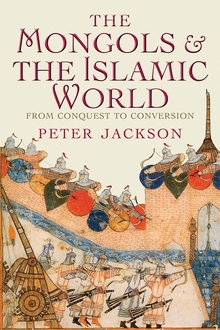 Described by publisher Yale University Press as "an epic historical consideration of the Mongol conquest of Western Asia and the spread of Islam during the years of non-Muslim rule," this book provides a "fresh and fascinating consideration of the years of infidel Mongol rule in Western Asia, drawing from an impressive array of primary soures as well as modern studies to demonstrate how Islam not only survived the savagery of the conquest, but spread throughout the empire". Described by publisher Yale University Press as "an epic historical consideration of the Mongol conquest of Western Asia and the spread of Islam during the years of non-Muslim rule," this book provides a "fresh and fascinating consideration of the years of infidel Mongol rule in Western Asia, drawing from an impressive array of primary soures as well as modern studies to demonstrate how Islam not only survived the savagery of the conquest, but spread throughout the empire".
Focusing less on the conquests and more on what followed, the book assesses the history of a part of the world that now includes Iran, Iraq, Turkey and Afghanistan as well as the various countries of Central Asia and parts of Eastern Europe. It also examines both the Muslim experience of Mongol sovereignty and the later conversion of descendants of the Mongol conquers to Islam.
Peter Jackson is emeritus professor of medieval history at Keele University. He has written previously on the Crusades, the eastern Islamic world and the Mongols. His previous books include The Mongols and the West, 122101420. He lives in Staffordshire, UK.
*********************************************
Archaeological Research in Asia (Volume 15 - September 2018, pp. 101-109, 137-145)
 The latest issue of Archaeological Research in Asia includes an article by Petya V. Andreeva and Christopher Atwood titled "Camp and Audience Scenes in Late Iron Age Rock Drawings from Khawtsgait, Mongolia". According to the abstract: The latest issue of Archaeological Research in Asia includes an article by Petya V. Andreeva and Christopher Atwood titled "Camp and Audience Scenes in Late Iron Age Rock Drawings from Khawtsgait, Mongolia". According to the abstract:
"Previous studies of petroglyphs in Mongolia have focused on the abundant Bronze Age examples. Recently, however, in the Khawtsgait site in southern Mongolia, two petroglyphs have come to light representing a major departure from Bronze Age examples in subject, mode of representation and parallels with funerary art. One depicts a nomadic camp scene head on, the other presents what seems to be a scene about an altar with a seated figure, possibly female, and standing figures. Relatively closer parallels to these figures exist in art found in funerary contexts particularly in Xiongnu sites and the Pazyryk tombs in the Russian Altai. Together with these finds, the Khawtsgait site provides new evidence of Iron Age material culture in funerary beliefs, along with the continuing links of the Mongolian plateau with the steppe west of the Altai".
That same issue of Archaeological Research in Asia also includes a second article on Mongolia, this one contributed by Leah R. Holguin and Troy Sternberg titled "A GIS Based Approach to Holocene Hydrology and Social Connectivity in the Gobi Desert, Mongolia." According to the abstract:
"This paper presents the results of a GIS derived drainage network, demonstrating a hypothesized model of the Ulaan Nuur paleo hydrological system in the Gobi Desert of Mongolia. Furthermore, this model was successfully used as the basis for field survey along the hypothesized southern edge of the paleo lake and associated paleo channels, which led to the discovery of four Neolithic sites, several Neolithic surface scatters, and one later period cemetery. This allows for the establishment of a potential, viable route of movement between the Gobi Altai and Bayanzag, along the southern paleo hydrological system of Ulaan Nuur. This case study further demonstrates that through examination of paleo hydrological landscapes in the Gobi Desert, GIS hydrology modelling may provide a reliable methodology to locate sites in other arid and semi-arid environments, and enable further evaluation of their relationships to past water courses".
*********************************************
Buddhism, Law & Society (Volume 2 — 2016 - 2017), edited by Rebecca Redwood French
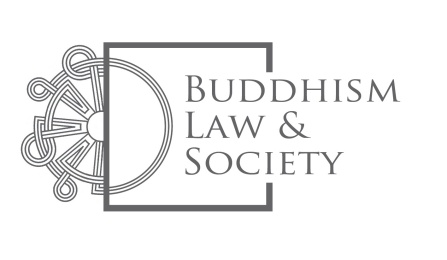 The latest issue of Buddhism, Law and Society includes one article specifically on Mongolia. Written by Vesna A. Wallace and published under the title “The Interface of Mongolian Nomadic Culture, Law and Monastic Sexual Morality”, it is described as follows: The latest issue of Buddhism, Law and Society includes one article specifically on Mongolia. Written by Vesna A. Wallace and published under the title “The Interface of Mongolian Nomadic Culture, Law and Monastic Sexual Morality”, it is described as follows:
“In traditional Mongolian nomadic society, which had its own culturally embedded dimensions of sexuality and highly flexible rules regulating social life, the monastic institutionalization of sexuality was a long process that has been met with resistance to this day. Mongolian Buddhists’ lenient attitude toward sexual desire also found its support in the Buddhist tantric teachings, as it has been often pointed out by contemporary monks in Mongolia in their response to the critics of their sexual conduct. A study of various laws instituted in Mongolia from the seventeenth to the early twentieth centuries reveals a variety of ways in which different governing bodies sought to negotiate the problem of monks’ sexual misconduct through their prohibitive and penal measures”.
*********************************************
Language, Media and Globalization in the Periphery: The Linguascapes of Popular Music in Mongolia by Sender Dovchin; 168 pages; hardback: $150 (Routledge, 2018)
 Despite their seeming isolation, countries such as Mongolia that are often regarded as being at a geographic, political and ecoonomic "periphery" can draw on a wide variety of linguistic and cultural resources from around the world, applying and adapting them for their own use. Based on examples gleaned through multiple ethnographic fieldwork visits to Mongolia, this book "presents an example of how peripheral contexts should be seen as crucial sites for understanding the current sociolinguistics of globalization". Despite their seeming isolation, countries such as Mongolia that are often regarded as being at a geographic, political and ecoonomic "periphery" can draw on a wide variety of linguistic and cultural resources from around the world, applying and adapting them for their own use. Based on examples gleaned through multiple ethnographic fieldwork visits to Mongolia, this book "presents an example of how peripheral contexts should be seen as crucial sites for understanding the current sociolinguistics of globalization".
The volume covers a number of contemporary themes including sociolinguistic diversity in the context of popular culture and media in a globalized world, with a particular emphasis on popular music. It also notes various "linguascapes" shaped by the impact of English and other languages on the local language practices of young Mongolian musicians. According to the publisher, "this notion of linguascapes adds new levels of analysis to common approaches to sociolinguistics of globalization, offering researchers new complex perspectives of linguistic diversity in the increasingly globalized world
Sender Dovchin is a Senior Research Fellow at Curtin University in Western Australia. Previously, she was Associate Professor in the Center for Language Research at the University of Aizu in Japan.
|
|
|
|